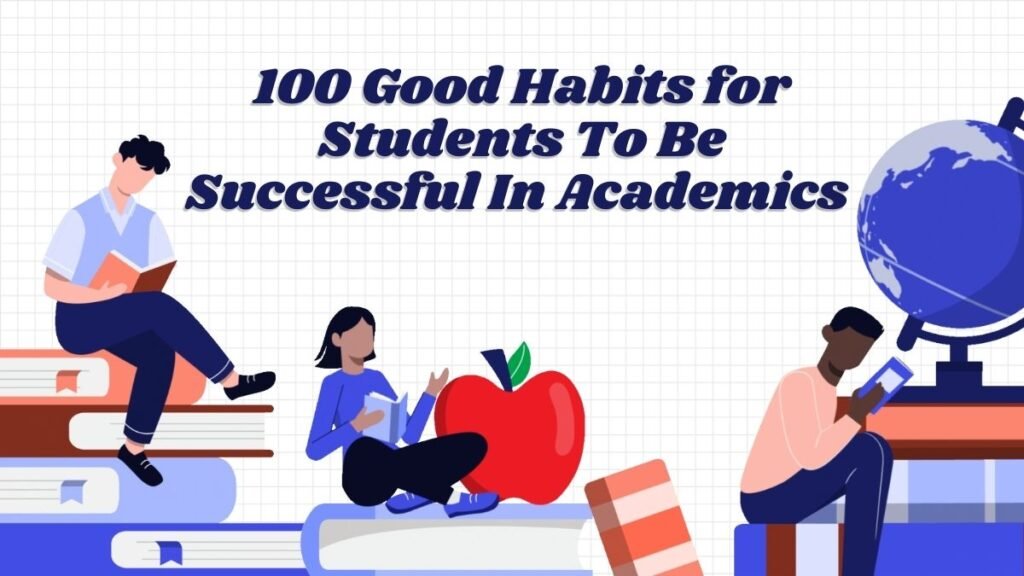Discover 100 good habits for students in academics, time management, exam confidence, mental well-being, and social dynamics. Transform your school experience with actionable tips for success and personal growth.
School is where you shape your future—a time to learn, grow, and explore passions. But it can be overwhelming. With smart habits, school becomes easier and more fulfilling. This guide offers 100 tips to:
- Boost Your Studies: Improve focus, memory, and study skills.
- Get Things Done: Manage time and stay organized.
- Excel in Exams: Approach tests confidently.
- Stay Healthy: Establish routines for a clear mind.
- Enjoy Social Life: Build connections and navigate friendships.
Whether you’re new or experienced, these habits will make school smarter and happier. Let’s unlock your potential with simple, effective strategies!
Importance of Good Habits for Students
School is a thrilling journey but can feel overwhelming. Good habits are your secret to success:
| Goals | Strategies |
|---|---|
| Balance Everything | Manage tasks efficiently to reduce stress and free up time. |
| Boost Performance | Study consistently, use effective learning strategies, and prioritize sleep for better focus and memory. |
| Build Confidence | Develop self-discipline and resilience through good habits like time management. |
| Stay Healthy and Motivated | Eat well, exercise, and sleep enough to keep energy high and mood positive. |
| Set a Strong Foundation | Habits learned now will benefit your future in academics and beyond. |
Start now and transform your student experience with these habits!
Benefits of Good Habits for Students
School life is hectic, but good habits can help:
| Goals | Strategies |
|---|---|
| Study Smart | Be consistent and focused. |
| Manage Time | Prioritize tasks and stay organized. |
| Stay Healthy | Exercise, eat well, and sleep enough. |
| Build Confidence | Set goals and stay disciplined. |
| Learn Skills | Develop time management for the future. |
This format keeps each goal and its corresponding strategies concise and easy to reference.
100 Good Habits for Students PDF
100 Good Habits for Students
Check out 100 good habits for students:-
Academic Habits
- Study consistently.
- Take effective notes during lectures.
- Set specific study goals for each session.
- Use a planner or digital calendar to organize tasks.
- Break tasks into smaller, manageable steps.
- Attend classes regularly and punctually.
- Actively participate in class discussions.
- Ask questions to clarify doubts.
- Review notes and materials daily.
- Practice active learning techniques like teaching others or summarizing.
Time Management Habits
- Prioritize tasks based on urgency and importance.
- Stick to a daily or weekly study schedule.
- Set timers to focus on tasks and take breaks.
- Use downtime effectively for quick reviews or planning.
- Limit distractions during study sessions.
- Delegate tasks when possible.
- Plan ahead for exams and assignments.
- Schedule relaxation time to recharge.
- Reflect on daily accomplishments and challenges.
- Adapt and adjust study schedules based on progress and goals.
Organizational Habits
- Maintain a tidy and organized study space.
- Keep notes and materials well-organized.
- Label folders and files clearly.
- Use color-coding for different subjects or topics.
- Keep a centralized calendar for deadlines and events.
- Review and update schedules regularly.
- Create and prioritize task checklists.
- Utilize digital tools for organization and productivity.
- Set reminders for important deadlines and tasks.
- Keep track of assignments and submissions.
Study Habits
- Find a quiet and comfortable place to study.
- Engage in active learning methods.
- Take short breaks during study sessions.
- Use mnemonic devices to aid memory.
- Practice past exams to familiarize with formats.
- Join or form study groups for collaborative learning.
- Use flashcards for quick review.
- Stay hydrated and eat nutritious snacks.
- Set specific study goals for each session.
- Review and revise material consistently.
Health and Well-being Habits
- Exercise regularly to reduce stress and stay fit.
- Eat balanced meals to fuel your body and mind.
- Drink plenty of water throughout the day.
- Ensure sufficient sleep for optimal cognitive function.
- Practice relaxation techniques like deep breathing or meditation.
- Take short breaks for movement and stretching.
- Limit caffeine intake to maintain energy levels.
- Maintain good posture while studying.
- Schedule regular health check-ups.
- Practice good personal hygiene for overall well-being.
Personal Development Habits
- Set personal goals for academic and personal growth.
- Embrace challenges as opportunities to learn.
- Read regularly to broaden knowledge and perspective.
- Volunteer or participate in community service.
- Learn and improve time management skills.
- Develop hobbies and interests outside of academics.
- Enhance communication skills through practice.
- Seek feedback to identify areas for improvement.
- Keep a journal to reflect on experiences and goals.
- Attend workshops or seminars to gain new skills and insights.
Social Habits
- Build positive relationships with peers and mentors.
- Collaborate and work well in group settings.
- Show empathy and kindness towards others.
- Resolve conflicts peacefully and respectfully.
- Join clubs, organizations, or sports teams.
- Attend school events and activities.
- Support classmates in their academic pursuits.
- Participate actively in study groups or projects.
- Foster inclusivity and respect diversity.
- Build a supportive network of friends and mentors.
Financial Habits
- Create a budget and track expenses.
- Save money regularly for future needs.
- Learn about financial literacy and management.
- Differentiate between needs and wants.
- Research scholarships and financial aid opportunities.
- Plan and save for major expenses.
- Open and manage a savings account.
- Learn about investments and financial planning.
- Seek advice from financial experts or counselors.
- Stay informed about economic trends and changes.
Technology and Media Habits
- Use technology for educational purposes effectively.
- Limit non-academic screen time to maintain focus.
- Protect online privacy and secure personal information.
- Verify information from reliable sources.
- Develop digital communication skills.
- Secure online accounts with strong passwords.
- Balance online and offline activities for well-rounded development.
- Use social media responsibly and positively.
- Stay updated on digital trends and advancements.
- Practice digital etiquette and respect online communities.
Career and Future Planning Habits
- Research career options and pathways.
- Set short-term and long-term career goals.
- Explore internships or job shadowing opportunities.
- Build a professional network through networking events.
- Attend career fairs, workshops, or seminars.
- Develop and update a professional resume or portfolio.
- Practice interview skills through mock interviews.
- Research colleges, universities, or vocational programs.
- Seek guidance from career counselors or mentors.
- Stay informed about industry trends and developments.
Incorporating these habits into your routine can enhance your academic performance, personal growth, and preparation for the future.
What are the 10 good habits for students?
Here are 10 simple habits for students:
| Goals | Strategies |
|---|---|
| Morning Routine | Start with exercise or breakfast. |
| Plan | Use a planner to organize tasks. |
| Avoid Procrastination | Break tasks into steps and reward yourself. |
| Active Learning | Take notes and use mind maps. |
| Focused Study | Create a distraction-free study space and take breaks. |
| Sleep Well | Get 7-8 hours of sleep. |
| Eat Healthy | Have balanced meals and stay hydrated. |
| Stay Active | Exercise regularly. |
| Collaborate | Join study groups and ask for help. |
| Celebrate Success | Acknowledge and reward your progress. |
What are 10 healthy habits for kids?
| Goals | Strategies |
|---|---|
| Eat Balanced | Include fruits, veggies, and whole grains. Limit sugary snacks. |
| Stay Active | Play or exercise for 60 minutes daily. |
| Sleep Well | Keep a consistent bedtime routine. |
| Drink Water | Stay hydrated with regular water breaks. |
| Hygiene Basics | Brush teeth, floss, and wash hands regularly. |
| Playtime | Enjoy unstructured play for creativity. |
| Limit Screen Time | Set clear rules for TV and devices. |
| Talk Openly | Create a safe space for feelings and concerns. |
| Deep Breaths | Teach simple relaxation exercises. |
| Family Fun | Schedule time together for bonding. |
These habits support kids’ health and happiness with ease.
What 5 habits do you need?
| Goals | Strategies |
|---|---|
| Prioritize Tasks | Say no when needed for better time management. |
| Stay Informed | Read, listen to podcasts, or take online courses. |
| Take Care of Yourself | Sleep well, eat healthy food, exercise, and engage in enjoyable activities. |
| Build Strong Relationships | Use effective communication and provide support. |
| Foster Positive Mindset | Practice optimism, gratitude, and resilience. |
These daily habits help manage time, prioritize well-being, and approach life with positivity and growth.
Conclusion
School is where your future takes flight—a time to explore passions, hone skills, and become your best self. This guide arms you with 100 powerful habits, covering everything from study tips to self-care tricks, designed to enhance your student journey. These habits aren’t strict rules but versatile tools. Try them out, find what clicks for you, and adapt as you grow.
Developing good habits takes effort, but the rewards are huge:
- Excel Academically: Manage time better, beat procrastination, and study smarter.
- Feel Better: Prioritize sleep, exercise, and self-care for a healthier you.
- Build Connections: Connect positively with classmates and teachers to support your journey.
- Boost Confidence: Grow discipline, resilience, and belief in yourself for future success.
Embrace the journey! Don’t let setbacks discourage you; celebrate progress, big or small. As you make these habits part of your routine, you’ll nurture a mindset for growth, a love for learning, and a foundation for lifelong achievements.
So, dive in, conquer your studies, and thrive in every aspect of student life. Remember, the power to succeed is already within you—unleash it with the magic of good habits!


